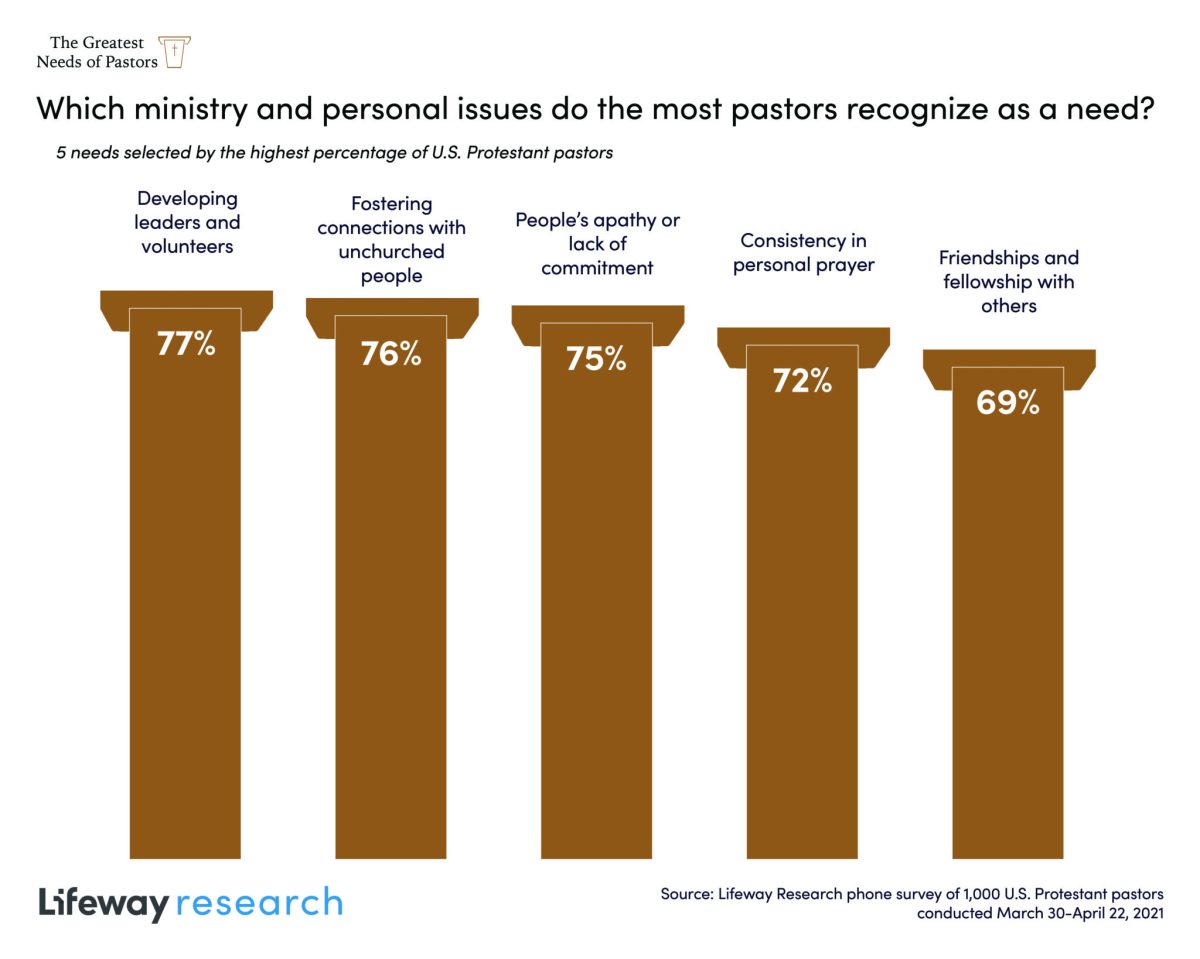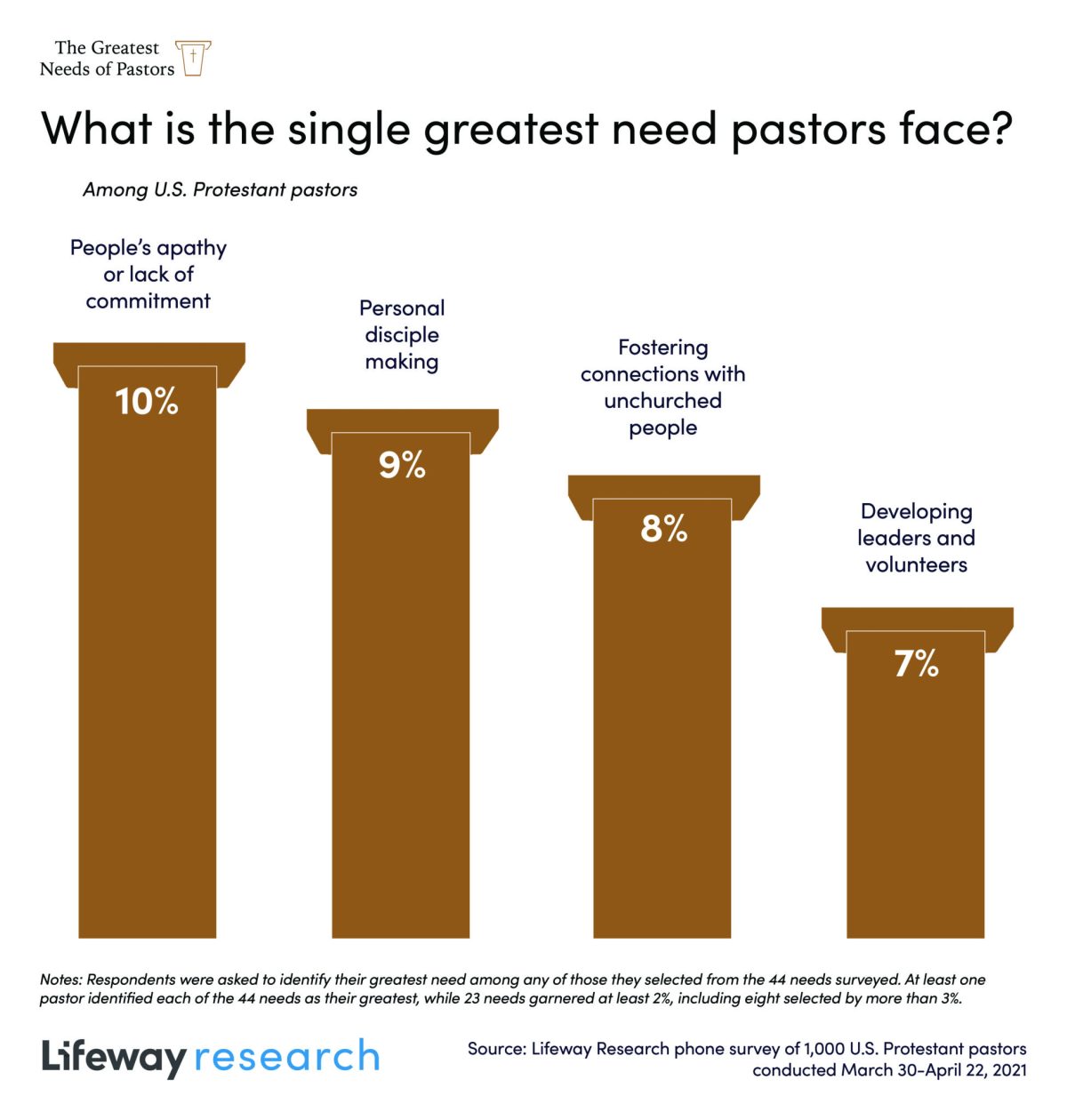Pastors face unique difficulties inherent in their career, but what are their greatest needs? Pastors themselves say they’re most concerned about seeing their churchgoers grow spiritually and making connections with those outside of their churches.
After speaking directly with pastors to gather their perspectives on their ministry and personal challenges, Lifeway Research surveyed 1,000 US pastors for the 2022 Greatest Needs of Pastors study to discover what they see as their most pressing issues.
“The pre-existing challenges of ministry were amplified by COVID, and it’s important we lean in and listen closely to pastors,” said Ben Mandrell, president of Lifeway Christian Resources. “This project has shed light on critical needs they have and will point the way forward in how we partner with them to fuel their ministries and improve their health in multiple areas.”
Scott McConnell, executive director of Lifeway Research, said his team began the study by speaking with more than 200 pastors, asking them to think beyond the current pandemic-related struggles and share some of the enduring needs of pastors and their churches today.
“Their responses to the challenges they face and the areas that are most important for them were then presented to more than 200 additional pastors,” explained McConnell. “Based on those responses, 1,000 pastors were asked about almost four dozen needs to measure the extent to which each is something they need to address today.”
Of the 44 needs identified by pastors and included in the study, 17 were selected by a majority as an issue they need to address.
- Developing leaders and volunteers: 77%
- Fostering connections with unchurched people: 76%
- People’s apathy or lack of commitment: 75%
- Consistency in personal prayer: 72%
- Friendships and fellowship with others: 69%
- Training current leaders and volunteers: 68%
- Consistency of Bible reading not related to sermon or teaching preparation: 68%
- Trusting God: 66%
- Relationships with other pastors: 64%
- Consistency in taking a Sabbath: 64%
- Stress: 63%
- Personal disciple making: 63%
- Confessing and repenting from personal sin: 61%
- Consistency exercising: 59%
- Avoiding overcommitment and over-work: 55%
- Challenging people where they lack obedience: 55%
- Time management: 51%

“The number and breadth of needs pastors are currently facing is staggering,” said McConnell. “All seven spiritual needs asked about on the survey are a current concern for most pastors, as well as practical, mental, self-care, skill-development, and needs around ministry difficulties. Clearly pastors are not looking for shortcuts and are taking their roles as spiritual leaders in their church seriously.”
The 44 identified needs fall into seven broader categories. Subsequent releases in Lifeway Research’s 2022 Greatest Needs of Pastors study will explore each of the categories and the related needs specifically.
Single greatest need
When asked to narrow down their list to the single greatest need requiring their attention, pastors’ responses varied.

At least one pastor surveyed picked each of the 44 possible needs, while 23 needs garnered at least 2 percent of pastors. Eight needs were chosen by more than 3 percent of pastors, and one reached double digits.
- People’s apathy or lack of commitment: 10%
- Personal disciple making: 9%
- Fostering connections with unchurched people: 8%
- Developing leaders and volunteers: 7%
- Establishing a compelling vision: 5%
- Technology: 4%
- Consistency in personal prayer: 4%
- Consistency exercising: 4%
“When asked to prioritize their own greatest need, pastors tend to put the needs of their church’s ministry ahead of personal needs,” said McConnell.
“Personally making disciples, developing leaders, connecting with those outside the church and mobilizing the people in their church are the most common ‘greatest needs’ and are among the most common needs pastors want to make a priority.”
Pastoral help
When thinking about getting help with their needs, pastors want to hear from their fellow clergy who have been through the same struggles.
Three in four US pastors (75%) say they would be interested in getting advice or guidance on the issues they are facing from other pastors who have already been through those problems. Similar numbers (74%) would like to hear from those who understand churches like theirs.
Another 70 percent would listen to other pastors who are currently facing the same needs. Slightly fewer (57%) want to hear from experts on those types of needs. Older pastors are the least likely to say they’d like advice from any of those sources.
“The most monumental needs of pastors are not new to this generation of pastors,” said McConnell. “They know other pastors and pastors who have gone before them are best positioned to understand and help them with the wide variety of ministry and personal needs a pastor faces.”
Still, previous Lifeway Research shows not all pastors are actively seeking out advice from their fellow clergy. More than 8 in 10 US Protestant pastors say they feel supported by other pastors in their area. Fewer than half (46%), however, know and spend time with 10 or more other local pastors, according to a 2020 Lifeway Research survey.
Most pastors (54%) have those relationships with fewer than 10 other area clergy, including 1 in 20 (5%) who aren’t connected with any area pastors and 8% who have relationships with only one or two other ministers.
Pastors may also look to retired pastors for advice and wisdom for navigating common challenges. A 2019 Lifeway Research study of retired Protestant pastors, ministers, and missionaries found some have struggled with the transition into retirement and are looking for ways to serve and connect with others.
More than 4 in 5 retired ministry workers (86%) say they have continued to make new friends in recent years, but 29 percent admit they feel lonely or isolated.
When asked what resources would most help them with their relationships today, most say they want to make additional ministry connections: 25 percent say making friends who have similar experience in ministry, 23 percent making friends who live near me, 20 percent relating to a church in which I am not in leadership, and 17 percent making friends who have had similar experience in leadership.
“Retired pastors and other ministry workers still want to serve the church,” said McConnell. “When Lifeway Research asked them how ministries could best serve those like them who are retired from full-time ministry, the most common response was to provide them with opportunities to serve or minister (16%). Current pastors looking for guidance may find retired pastors ready and willing to help.”
The phone survey of 1,000 Protestant pastors was conducted March 30 – April 22, 2021. The sample provides 95 percent confidence that the sampling error does not exceed plus or minus 3.1 percent.











